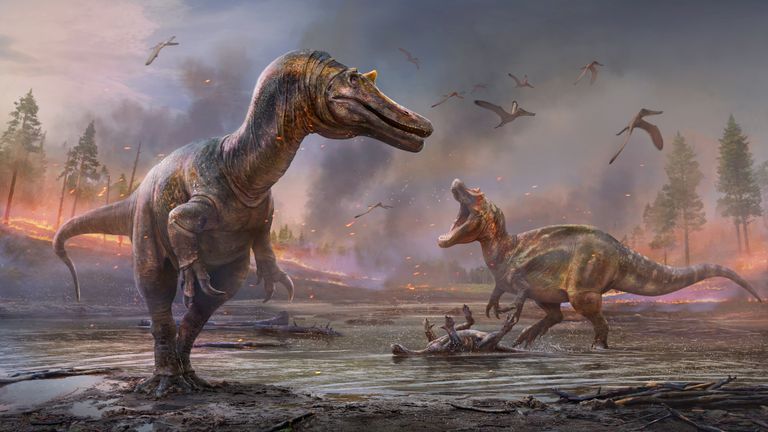The fossil of a herbivorous dinosaur, as big as an American male bison, has been discovered on the Isle of Wight.
It is the most complete dinosaur skeleton discovered in the UK in a century, with 149 bones in total.
The hefty dinosaur, now called Comptonatus chasei, roamed southern England around 125 million years ago and would have weighed as much as an African elephant.
The isle of Wight only became separated from the mainland around 7,000 years ago.
“It was likely to be a herding animal, so possibly large herds of these heavy dinosaurs may have been thundering around if spooked by predators on the floodplains,” said Jeremy Lockwood, a PhD student at the University of Portsmouth.
The dinosaur belongs to a group of herbivorous dinosaurs known as iguanodontians, large, bulky creatures often described as the “cows of the Cretaceous period” by palaeontologists.
It was discovered by fossil hunter Nick Chase who sadly died of cancer just before the COVID-19 pandemic. The species is named after him.
It took Mr Lockwood and his colleagues several years before the specimen could be prepared for analysis.
He said: “I began looking at the specimen six years ago and described it as part of my PhD thesis, which took five years.
“So it was quite a long journey from finding to publication.”
Paying tribute to Mr Chase, Mr Lockwood said: “Nick had a phenomenal nose for finding dinosaur bones.”
“He collected fossils daily in all weathers and donated them to museums,” he added.
“I was hoping we’d spend our dotage collecting together as we were of similar ages, but sadly that wasn’t to be the case.
“Despite his many wonderful discoveries over the years, including the most complete Iguanodon skull ever found in Britain, this is the first dinosaur to be named after him.”
Nick Chase also discovered the remains of Europe’s largest-ever land-based predator dinosaur on the island, which were revealed last year.
Read more from Sky News:
Arsenic, lead and other toxic metals found in tampons, study says
Cow flu takes ‘dangerous’ step towards infecting humans
‘Super moss’ discovered that could help sustain life on Mars
The Isle of Wight has become a fossil hunters’ paradise in recent years, with eight extinct species being named there in the last five years.
Mr Lockwood said the latest “remarkable find” shows southern England may have once had “one of the world’s most diverse ecosystems”.
In fact, the Natural History Museum describes the Isle of Wight as “one of the UK’s richest dinosaur fossil sites”.
Last year, a new species of armoured dinosaur was found on the island and bones from a new species in the Tyrannosaurus rex family were discovered four years ago by two fossil hunters on separate holidays.
In 2021, two species of large predatory dinosaur were revealed as well.
Scientists named one of them the “horned crocodile-faced hell heron”, or Ceratosuchops inferodios in Latin.
One of the palaeontologists involved in the find said he’d been waiting for a discovery like that on the Isle of Wight for a couple of decades, but that finding two in close succession was a “huge surprise”.





